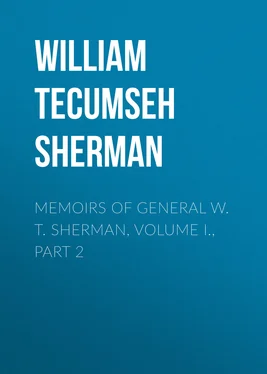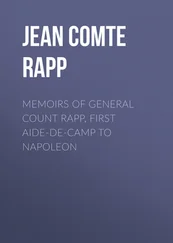William Tecumseh Sherman - Memoirs of General W. T. Sherman, Volume I., Part 2
Здесь есть возможность читать онлайн «William Tecumseh Sherman - Memoirs of General W. T. Sherman, Volume I., Part 2» — ознакомительный отрывок электронной книги совершенно бесплатно, а после прочтения отрывка купить полную версию. В некоторых случаях можно слушать аудио, скачать через торрент в формате fb2 и присутствует краткое содержание. Жанр: Биографии и Мемуары, История, foreign_edu, foreign_antique, foreign_prose, на английском языке. Описание произведения, (предисловие) а так же отзывы посетителей доступны на портале библиотеки ЛибКат.
- Название:Memoirs of General W. T. Sherman, Volume I., Part 2
- Автор:
- Жанр:
- Год:неизвестен
- ISBN:нет данных
- Рейтинг книги:3 / 5. Голосов: 1
-
Избранное:Добавить в избранное
- Отзывы:
-
Ваша оценка:
- 60
- 1
- 2
- 3
- 4
- 5
Memoirs of General W. T. Sherman, Volume I., Part 2: краткое содержание, описание и аннотация
Предлагаем к чтению аннотацию, описание, краткое содержание или предисловие (зависит от того, что написал сам автор книги «Memoirs of General W. T. Sherman, Volume I., Part 2»). Если вы не нашли необходимую информацию о книге — напишите в комментариях, мы постараемся отыскать её.
Memoirs of General W. T. Sherman, Volume I., Part 2 — читать онлайн ознакомительный отрывок
Ниже представлен текст книги, разбитый по страницам. Система сохранения места последней прочитанной страницы, позволяет с удобством читать онлайн бесплатно книгу «Memoirs of General W. T. Sherman, Volume I., Part 2», без необходимости каждый раз заново искать на чём Вы остановились. Поставьте закладку, и сможете в любой момент перейти на страницу, на которой закончили чтение.
Интервал:
Закладка:
I am told that my estimate of troops needed for this line, viz., two hundred thousand, has been construed to my prejudice, and therefore leave it for the future. This is the great centre on which our enemies can concentrate whatever force is not employed elsewhere. Detailed statement of present force inclosed with this.
With great respect, your obedient servant,
W. T. SHERMAN, Brigadier-General commanding.
BRIGADIER-GENERAL McCOOK'S CAMP, AT NOLIN, FIFTY-TWO MILES FROM LOUISVILLE, KENTUCKY, NOVEMBER 4, 1861.
First Brigade (General ROUSSEAU).-Third Kentucky, Colonel Bulkley; Fourth Kentucky, Colonel Whittaker; First Cavalry, Colonel Board; Stone's battery; two companies Nineteenth United States Infantry, and two companies Fifteenth United States Infantry, Captain Gilman.
Second Brigade (General T. J. WOOD).-Thirty-eighth Indiana, Colonel Scribner; Thirty-ninth Indiana, Colonel Harrison; Thirtieth Indiana, Colonel Bass; Twenty-ninth Indiana, Colonel Miller.
Third Brigade (General JOHNSON).-Forty-ninth Ohio, Colonel Gibson; Fifteenth Ohio, Colonel Dickey; Thirty-fourth Illinois, Colonel King; Thirty-second Indiana, Colonel Willach.
Fourth Brigade (General NEGLEY).-Seventy-seventh Pennsylvania, Colonel Hambright; Seventy-eighth Pennsylvania, Colonel Sinnell; Seventy-ninth Pennsylvania, Colonel Stambaugh; Battery, Captain Mueller.
Camp Dick Robinson (General G. H. THOMAS).–Kentucky, Colonel Bramlette;—Kentucky, Colonel Fry;—Kentucky Cavalry, Colonel Woolford; Fourteenth Ohio, Colonel Steadman; First Artillery, Colonel Barnett; Third Ohio, Colonel Carter;—East Tennessee, Colonel Byrd.
Bardstown, Kentucky.-Tenth Indiana, Colonel Manson.
Crab Orchard.-Thirty-third Indiana, Colonel Coburn.
Jeffersonville, Indiana.-Thirty-fourth Indiana, Colonel Steele; Thirty-sixth Indiana, Colonel Gross; First Wisconsin, Colonel Starkweather.
Mouth of Salt River.-Ninth Michigan, Colonel Duffield; Thirty-seventh Indiana, Colonel Hazzard.
Lebanon Junction..-Second Minnesota, Colonel Van Cleve.
Olympian Springs.-Second Ohio, Colonel Harris.
Cynthiana, Kentucky.-Thirty-fifth Ohio, Colonel Vandever.
Nicholasville, Kentucky.-Twenty-first Ohio, Colonel Norton; Thirty-eighth Ohio, Colonel Bradley.
Big Hill.-Seventeenth Ohio, Colonel Connell.
Colesburg.-Twenty-fourth Illinois, Colonel Hecker.
Elizabethtown, Kentucky.-Nineteenth Illinois, Colonel Turchin.
Owensboro' or Henderson.-Thirty-first Indiana, Colonel Cruft; Colonel Edwards, forming Rock Castle; Colonel Boyle, Harrodsburg; Colonel Barney, Irvine; Colonel Hazzard, Burksville; Colonel Haskins, Somerset.
And, in order to conclude this subject, I also add copies of two telegraphic dispatches, sent for General McClellan's use about the same time, which are all the official letters received at his headquarters, as certified by the Adjutant-General, L. Thomas, in a letter of February 1, 1862; in answer to an application of my brother, Senator John Sherman, and on which I was adjudged insane:
Louisville, November 3, 10 p.m.
To General McLELLAN, Washington, D. C.:
Dispatch just received. We are forced to operate on three lines, all dependent on railroads of doubtful safety, requiring strong guards. From Paris to Prestonbnrg, three Ohio regiments and some militia—enemy variously reported from thirty-five hundred to seven thousand. From Lexington toward Cumberland Gap, Brigadier-General Thomas, one Indiana and five Ohio regiments, two Kentucky and two Tennessee; hired wagons and badly clad. Zollicoffer, at Cumberland Ford, about seven thousand. Lee reported on the way with Virginia reenforcements. In front of Louisville, fifty-two miles, McCook, with four brigades of about thirteen thousand, with four regiments to guard the railroad, at all times in danger. Enemy along the railroad from Green River to Bowling Green, Nashville, and Clarksville. Buckner, Hardee, Sidney Johnston, Folk, and Pillow, the two former in immediate command, the force as large as they want or can subsist, from twenty-five to thirty thousand. Bowling Green strongly fortified. Our forces too small to do good, and too large to sacrifice.
W. T. SHERMAN, Brigadier-General.
HEADQUARTERS THE DEPARTMENT OF THE CUMBERLAND, Louisville,
Kentucky, November 6, 1861
General L. THOMAS, Adjutant-General.
Sir: General McClellan telegraphs me to report to him daily the situation of affairs here. The country is so large that it is impossible to give clear and definite views. Our enemies have a terrible advantage in the fact that in our midst, in our camps, and along our avenues of travel, they have active partisans, farmers and business-men, who seemingly pursue their usual calling, but are in fact spies. They report all our movements and strength, while we can procure information only by circuitous and unreliable means. I inclose you the copy of an intercepted letter, which is but the type of others. Many men from every part of the State are now enrolled under Buckner—have gone to him—while ours have to be raised in neighborhoods, and cannot be called together except at long notice. These volunteers are being organized under the laws of the State, and the 10th of November is fixed for the time of consolidating them into companies and regiments. Many of them are armed by the United States as home guards, and many by General Anderson and myself, because of the necessity of being armed to guard their camps against internal enemies. Should we be overwhelmed, they would scatter, and their arms and clothing will go to the enemy, furnishing the very material they so much need. We should have here a very large force, sufficient to give confidence to the Union men of the ability to do what should be done—possess ourselves of all the State. But all see and feel we are brought to a stand-still, and this produces doubt and alarm. With our present force it would be simple madness to cross Green River, and yet hesitation may be as fatal. In like manner the other columns are in peril, not so much in front as rear, the railroads over which our stores must pass being much exposed. I have the Nashville Railroad guarded by three regiments, yet it is far from being safe; and, the moment actual hostilities commence, these roads will be interrupted, and we will be in a dilemma. To meet this in part I have put a cargo of provisions at the mouth of Salt River, guarded by two regiments. All these detachments weaken the main force, and endanger the whole. Do not conclude, as before, that I exaggerate the facts. They are as stated, and the future looks as dark as possible. It would be better if some man of sanguine mind were here, for I am forced to order according to my convictions.
Yours truly,
W. T. SHERMAN, Brigadier-General commanding.
After the war was over, General Thomas J. Wood, then in command of the district of Vicksburg, prepared a statement addressed to the public, describing the interview with the Secretary of War, which he calls a "Council of War." I did not then deem it necessary to renew a matter which had been swept into oblivion by the war itself; but, as it is evidence by an eyewitness, it is worthy of insertion here.
STATEMENT.
On the 11th of October, 1861, the writer, who had been personally on mustering duty in Indiana, was appointed a brigadier-general of volunteers, and ordered to report to General Sherman, then in command of the Department of the Cumberland, with his headquarters at Louisville, having succeeded General Robert Anderson. When the writer was about leaving Indianapolis to proceed to Louisville, Mr. Cameron, returning from his famous visit of inspection to General Fremont's department, at St. Louis, Missouri, arrived at Indianapolis, and announced his intention to visit General Sherman.
The writer was invited to accompany the party to Louisville. Taking the early morning train from Indianapolis to Louisville on the 16th of October, 1861, the party arrived in Jeffersonville shortly after mid-day. General Sherman met the party in Jeffersonville, and accompanied it to the Galt House, in Louisville, the hotel at which he was stopping.
Читать дальшеИнтервал:
Закладка:
Похожие книги на «Memoirs of General W. T. Sherman, Volume I., Part 2»
Представляем Вашему вниманию похожие книги на «Memoirs of General W. T. Sherman, Volume I., Part 2» списком для выбора. Мы отобрали схожую по названию и смыслу литературу в надежде предоставить читателям больше вариантов отыскать новые, интересные, ещё непрочитанные произведения.
Обсуждение, отзывы о книге «Memoirs of General W. T. Sherman, Volume I., Part 2» и просто собственные мнения читателей. Оставьте ваши комментарии, напишите, что Вы думаете о произведении, его смысле или главных героях. Укажите что конкретно понравилось, а что нет, и почему Вы так считаете.












